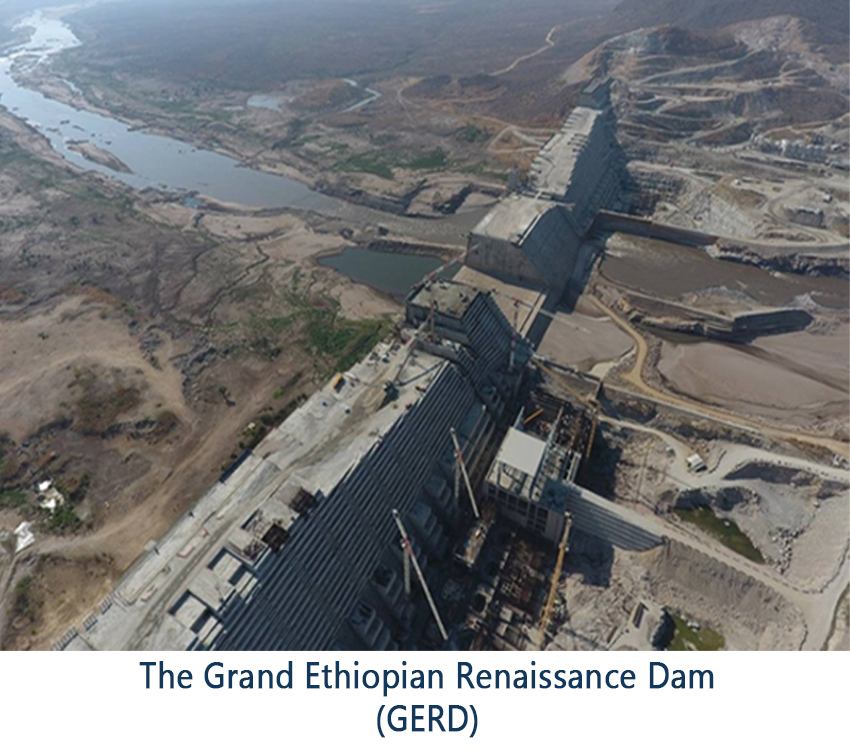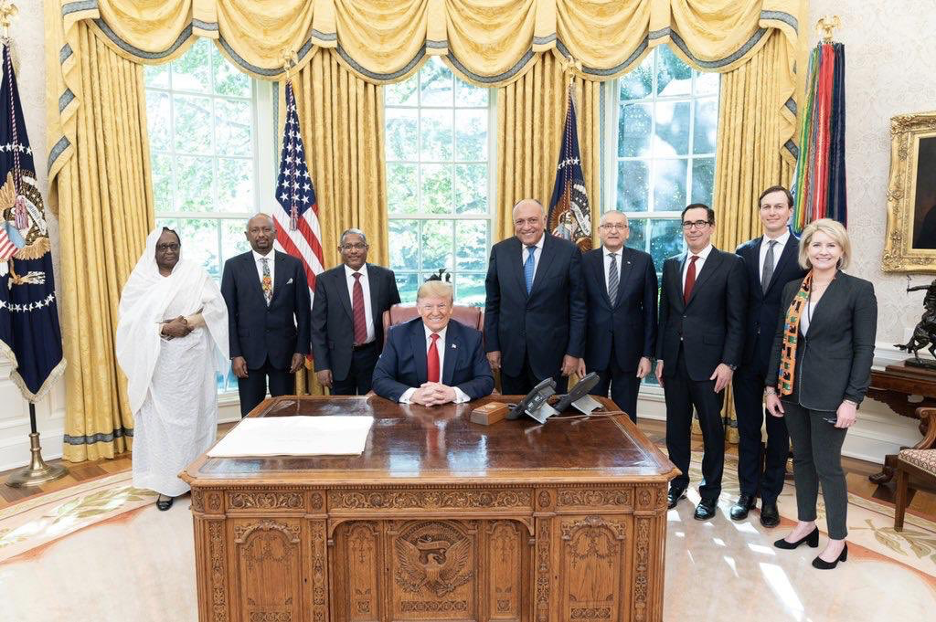The Genesis and Current Status of The Trilateral Discussions on GERD and Ethiopia’s Position
In April 2011, Ethiopia embarked on the construction of the Grand Ethiopian Renaissance Dam at a place called Guba in North Western Ethiopia along the Blue Nile. When completed in the next few years, the Grand Ethiopian Renaissance Dam (hereafter GERD) will be the largest dam in Africa: 1,800 m long, 155 m high and with a total volume of 74 billion m³. The GERD has an installed capacity of 5250 MW and an annual generation capacity of 15, 000 GWh/year.
The purpose of the GERD is mainly producing electricity for Ethiopia’s 100+ million people, of which around 70% have no access to electricity. As such, the dam will help millions of Ethiopians to ‘have a supper with the light on’, in the words of H.E. President Sahle-Work Zewde of Ethiopia.
The transformative implications of the GERD are not confined to the development needs and aspirations of Ethiopia, but also to the wider region especially in terms of enhancing regional integration in North Eastern Africa. For one, the dam will be able to generate electricity amounting to 5250 MW of power, of which the significant portion will be exported to neighbouring countries. This will enable neighbouring countries to buy electricity from Ethiopia at a very cheap rate. This is of great significance in connecting the region and in helping facilitate regional interconnectedness and integration in the Greater Horn of Africa region.
In addition to generating electricity, the GERD will also help reduce high seasonal variability and ensure regulated flow of water throughout the year. The GERD will also serve as an additional water bank with less evaporation rate, provide new water by avoiding overbank spillage, reduce sediment load and increase the life of downstream reservoirs and water infrastructures, and offers protection against floods and has less evaporation of water. Therefore, the dam is truly transformative in every sense of the term.
In this regard, Ethiopia’s inalienable right to utilize its natural resources, including transboundary water resources, has always been underpinned by respect to international legal regimes that govern these issues, namely the principle of ‘equitable and reasonable utilization’ and ‘causing of no significant harm’.
It is with this imperative that Ethiopia has been an active actor in negotiating the Cooperative Framework Agreement (CFA) with the aim of establishing a Nile River Basin Commission to ensure an equitable and reasonable utilization of the waters of the Nile and its cooperative management by all riparian states. So far, to date, four Nile riparian countries have ratified the CFA, and other members are also expected to ratify it.
Moreover, right after the start of the construction of the GERD, Ethiopia proposed to Egypt and the Sudan, the two downstream countries of the Nile River, the establishment of an International Panel of Experts (IPoE) in 2012 to transparently share information and examine the impact of the GERD on downstream countries. The International Panel of Experts (IPoE) has been composed of two experts from each of the countries, i.e. Egypt, Ethiopia and Sudan, and international experts from Germany, South Africa, France and Britain.
This unprecedented and proactive initiative of Ethiopia to establish Trilateral Mechanism has been aimed at building mutual trust and confidence among the lower riparian states. This has in turn helped keep the dialogue alive among the technical experts of Ethiopia, Egypt and the Sudan.
The signing of the Declaration of Principles (DOP) by the leaders of the three countries in March 23, 2015 is one of the results of this continued dialogue among the three countries. The DOP has helped frame the GERD consultations on internationally recognized principles of “equitable and reasonable utilization” and “causing of no significant harm”.
Moreover, in an attempt to explore win-win mechanisms and options for filling and operation of the GERD, the three countries established the National Independent Scientific Research Group (NISRG) on the 15th of May 2018. The NISRG is composed of five scientists from each of the three countries i.e Egypt, Ethiopia and Sudan.
After its establishment in May 2018, the NISRG carried out modeling and scenario-based analysis of filling options for the GERD. The Group evaluated the various options by analyzing impacts on all three countries. The NISRG conducted four meetings in which the Group deliberated on the filling options proposed by Ethiopia and came up with a compromise filling options that by and large accommodated the concerns of Egypt and Sudan. The outcome of the September 25, 2018 meeting of the NISRG was the culmination of the four meetings of the NISRG at which the Group submitted its findings to the ministers of water affairs of Egypt, Ethiopia and Sudan. However, the technical track was halted for sometimes due to the withdrawal of Egypt from the process.
The meeting between H.E. PM Abiy Ahmed of Ethiopia and President el-Sisi of Egypt on the sidelines of the Russia-Africa Summit at Sochi on the 24th of October 2019 helped to resume the afore-mentioned technical track meetings. The trilateral meetings of the foreign and water ministers of Ethiopia, Egypt and the Sudan in Washington, D.C. on November 6, 2019 was also the continuation of the bilateral meetings that had happened in Sochi, Russia. The D.C. discussions, which saw the participation of the US Secretary of Treasury H.E. Steven T. Mnuchin and World Bank President David R. Malpass, involved discussions on the next procedures for resuming the trilateral technical negotiations among the three countries so as to finalize these negotiations until January 25, 2019. These meetings have been helpful in communicating to our partners the intentions of Ethiopia and the benefits of the GERD not only to Ethiopia but also to downstream countries.
After DC discussions, the ministers of Egypt, Ethiopia, and the Sudan reaffirmed their joint commitment to reach a comprehensive, cooperative, adaptive, sustainable, and mutually beneficial agreement on the filling and operation of the Grand Ethiopian Renaissance Dam and to establish a clear process for fulfilling that commitment in accordance with the 2015 Declaration of Principles which was signed by the three countries.
The Foreign Ministers also agreed to restart the technical track negotiations. As mentioned earlier, the technical track which consists of 15 scientists from the three countries established in May 15, 2018 had agreed to hold nine meetings guided by water ministers of the three countries, and to submit their recommendations on the filling and operation of the GERD. The technical track meetings were halted after the fifth meeting due to the Egyptian withdrawal from the discussions. Hence, what the Foreign Ministers agreed in DC was to resume the technical track meetings and complete the work in four sessions. The three countries’ Water Ministers will hold four meetings to guide the technical level meetings and to consider the technical team outcomes.
The ministers also agreed to work toward completion of an agreement by January 15, 2020, and would attend two meetings in Washington, D.C. on December 9, 2019 and January 13, 2020, to assess and support progress.
Based on the agreement reached in D.C., the stalled trilateral technical negotiations resumed in Addis Ababa, Ethiopia, on the 25th and 26th of November 2019. Following Addis, the latest technical negotiations have happened in Cairo on the 2nd and 3rd of December 2019. Moreover, the three countries also met in Washington DC again on the 9th of December 2019 to review the progress made during the last two technical meetings in Addis and Cairo respectively. As such, the three countries appreciated the observer role of the US and the WB and set the direction for the next technical meetings in Khartoum and Addis Ababa.
Overall, significant progresses have been achieved during these technical negotiations. It is also Ethiopia’s firm belief that a win-win agreement could be reached before January 15th 2020.
The participation of the WB and the US as mere observers of these technical negotiations has already had and will continue to have a positive role in encouraging mutual trust and assurance, thereby incentivizing all actors to commit to the negotiations in good faith and to remain true to their words. If there is anything that the latest negotiations in Addis have proven, it is the fact that it is possible to devise a common technical solution to technical matters if and when countries negotiate in good faith and commitment.


(Foreign and Water Ministers of Ethiopia, Egypt and the Sudan met President Donald Trump at the White House. Credit: @realDonaldTrump)
